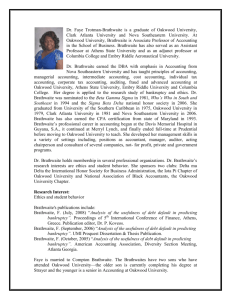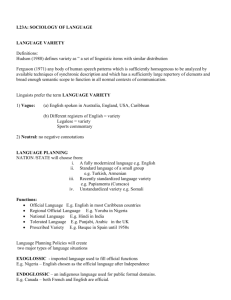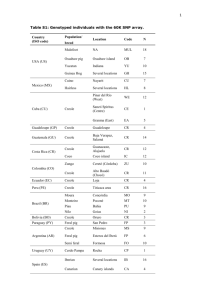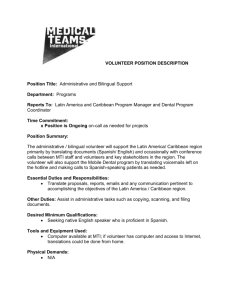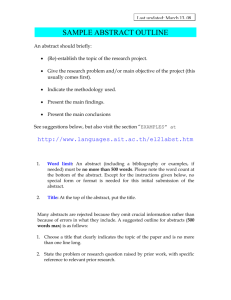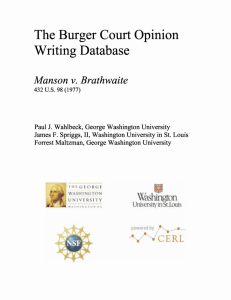EJES translating ethnicity Brathwaite.doc
advertisement
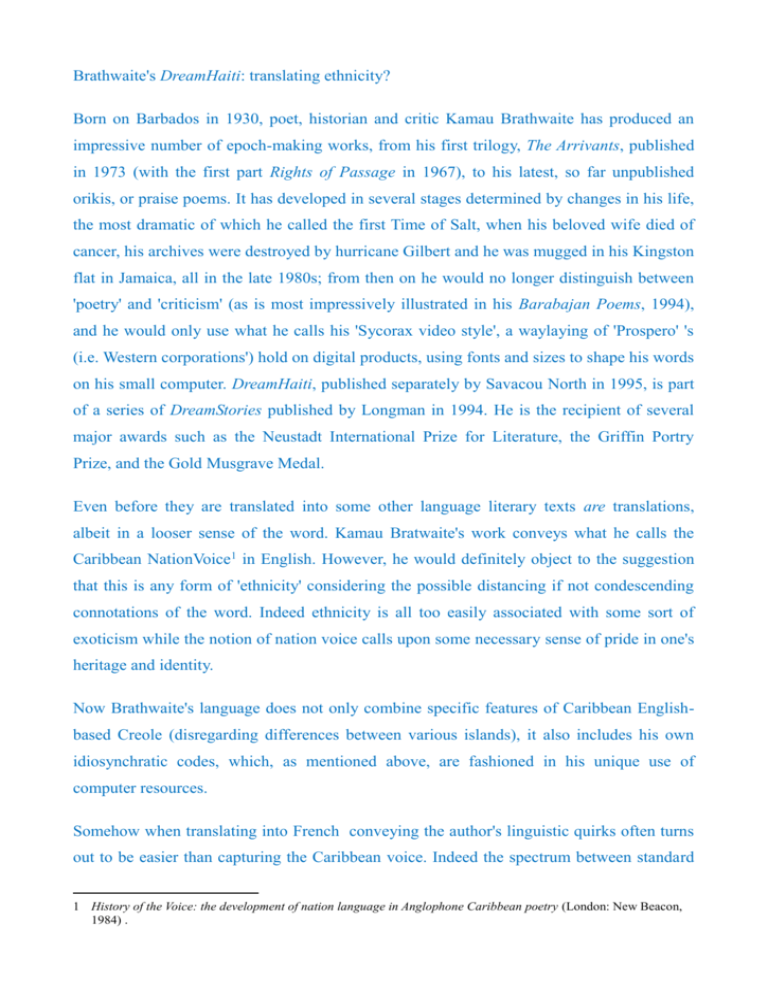
Brathwaite's DreamHaiti: translating ethnicity? Born on Barbados in 1930, poet, historian and critic Kamau Brathwaite has produced an impressive number of epoch-making works, from his first trilogy, The Arrivants, published in 1973 (with the first part Rights of Passage in 1967), to his latest, so far unpublished orikis, or praise poems. It has developed in several stages determined by changes in his life, the most dramatic of which he called the first Time of Salt, when his beloved wife died of cancer, his archives were destroyed by hurricane Gilbert and he was mugged in his Kingston flat in Jamaica, all in the late 1980s; from then on he would no longer distinguish between 'poetry' and 'criticism' (as is most impressively illustrated in his Barabajan Poems, 1994), and he would only use what he calls his 'Sycorax video style', a waylaying of 'Prospero' 's (i.e. Western corporations') hold on digital products, using fonts and sizes to shape his words on his small computer. DreamHaiti, published separately by Savacou North in 1995, is part of a series of DreamStories published by Longman in 1994. He is the recipient of several major awards such as the Neustadt International Prize for Literature, the Griffin Portry Prize, and the Gold Musgrave Medal. Even before they are translated into some other language literary texts are translations, albeit in a looser sense of the word. Kamau Bratwaite's work conveys what he calls the Caribbean NationVoice1 in English. However, he would definitely object to the suggestion that this is any form of 'ethnicity' considering the possible distancing if not condescending connotations of the word. Indeed ethnicity is all too easily associated with some sort of exoticism while the notion of nation voice calls upon some necessary sense of pride in one's heritage and identity. Now Brathwaite's language does not only combine specific features of Caribbean Englishbased Creole (disregarding differences between various islands), it also includes his own idiosynchratic codes, which, as mentioned above, are fashioned in his unique use of computer resources. Somehow when translating into French conveying the author's linguistic quirks often turns out to be easier than capturing the Caribbean voice. Indeed the spectrum between standard 1 History of the Voice: the development of nation language in Anglophone Caribbean poetry (London: New Beacon, 1984) . French and Creole is much less of a continuum than between 'standard English' (and the quotation marks tell a lot) and local speech with its African inflections and different grammatical rules. An anglophone reader with hardly any notion of, say, Jamaican Englishbased Creole, will be able to make sense, or at least guess the meaning, of passages written in Jamaican vernacular, wheras a Francophone reader will be completely lost in front of a text in Creole. This account for writers such as Chamoiseau or Confiant, who are conversant in French-based Creole, choosing to adapt the local language and in fact creating a literary pseudo-Creole when writing their novels in French. The crux of the matter lies of course in how you translate departures from standard English, knowing that the normative (repressive) impulse is much stronger in French than in most other languages, and that departures tend to be perceived as mistakes or blunders, which means you cannot possibly retain the deviant savour of the original. By contrast colloquialisms and swear words will easily be retrieved. Translating Brathwaite means hoisting high the sails of imagination and, to some extent at least, letting go of the steering wheel: his words steer you, no will of your own. It also involves rallying all the resources of the target language, often beyond what is recorded in dictionaries. When his sea is 'slake grey' instead of 'slate grey' it becomes 'gris armoise'; his 'boy' recalling 'buoy' turns into 'bougre' next to 'bouée'; 'sea come no father' could have been 'Ici la mer s'apert', but I preferred a more suggestive 'Ici la mer s'atterre'; 'I memember' becomes 'je me remécore', to retain the reference to the body; the US ship is a coast guard cutter but it is often spelled 'gutter', which I attempted to convey in 'corvette' / 'crevette'; when this vessel is described as 'slipshape and bristol fashion', though the reference is to a well done thing, we can also hear the undertow of slave trade that made for the wealth of nations, and of many a harbour city, so this becomes 'parfaitement réglissé . . . sur le pont de Nantes'. This might be dismissed as domesticating with a vengeance, yet the text is dense and complex and allusions deserve to be retained and made as accessible to French readers as to the original audience: DreamHaiti2 tells about desperate crossings or passages, those undertaken by starving Haitian refugees looking for some decent life echoing the enforced 2 Kamau Brathwaite's DreamHaiti, NY, Savacou North, 1995; translated into French and published as RêvHaïti (Montreal,Mémoire d'encrier, 2013); staged by Compagnie AWA in a montage by Frédérique Liebaut entitled Et ce n'était pas qu'on allait quelque part. middle passage two or three centuries earlier. The sea's greedy jaws swallowing the sun of their hope. Lifelines for ever refused. And their plight turned into a poem. The extract that is reproduced here includes Brathwaite's NAM sign, the name without the handle of the e, the expression of a person's inalienable essence. Extreme distress is expressed in the deliberately chaotic syntax. The right justified lines are the poet's outcry and protest (not the poet on the deck of the cutter, though who can tell?) The reference to Soyinka's title (Season of Anomy) may be lost but what must ring out loud and clear is the violence of the outrage. The corrosive salt is one of the elements that trace a continuity between the several passages / crossings that are called upon. Kamau Brathwaite weaves the songs of lost bodies through recreated words, claiming in all of them the right to an upright existence. Translators have to pick up the thread and weave similar patterns.

